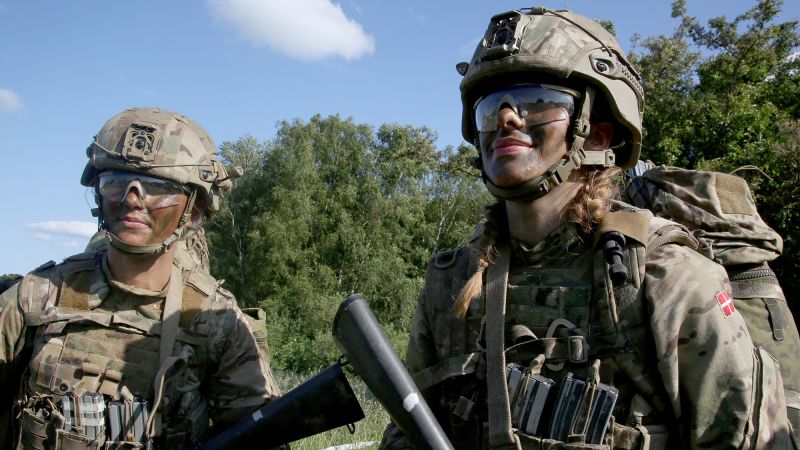Denmark has announced a significant shift in its military conscription policy, now requiring women to register for potential military service. This decision, effective for women turning 18 after July 1, 2025, comes as the Nordic nation seeks to bolster its defense capabilities in response to increasing security challenges across Europe.
The Danish parliament passed the law in June 2023, aligning women’s conscription measures with those already in place for men. Previously, women, who constituted about 24% of new recruits last year, could join the military voluntarily. The move is part of a broader effort to enhance national security and military readiness.
Rationale Behind the Policy Change
The inclusion of women in conscription reflects Denmark’s strategic response to the evolving geopolitical landscape. As tensions rise across Europe, particularly in light of recent conflicts and military build-ups, Denmark is taking proactive steps to ensure its armed forces are adequately staffed and prepared.
Katrine, a recruit in the Danish Royal Life Guard, emphasized the necessity of this change, stating, “In the world situation we’re in right now, it’s necessary to have more conscripts, and I think that women should contribute to that equally, as men do.”
Adjustments for Inclusivity
To accommodate the increased number of female recruits, the Danish armed forces are making necessary adjustments in terms of facilities and equipment. Currently, much of the military gear is designed with men in mind, which poses challenges for female soldiers.
“There are different things that they need to improve, especially in terms of equipment. Right now, it’s made for men, so perhaps the rucksacks are a bit too large and the uniforms are large as well,” Katrine noted, highlighting the need for gender-specific modifications.
Strategic Military Enhancements
This development follows Denmark’s recent agreement with NATO allies to boost defense spending. The country plans to gradually extend the conscription period from four months to 11 months by 2026. Additionally, Denmark aims to increase the number of recruits from approximately 5,000 to 7,500 by 2033, reflecting a long-term commitment to strengthening its military forces.
Denmark plans to raise the number of recruits doing military service from around 5,000 now to 7,500 in 2033.
Historical Context and Comparisons
Historically, Denmark has maintained a policy of voluntary military service for women, a stance that has evolved over time. The current shift marks a significant departure from past practices, aligning Denmark with other countries that have implemented gender-neutral conscription policies.
Countries like Norway and Israel have long included women in their conscription processes, citing the benefits of a more diverse and inclusive military force. Denmark’s decision is seen as a step towards modernizing its military and ensuring equal participation across genders.
Looking Ahead: Implications and Challenges
The expansion of conscription to include women is expected to have far-reaching implications for Denmark’s military and society. While it presents opportunities for greater gender equality and inclusivity, it also poses challenges in terms of resource allocation and infrastructure adaptation.
Experts suggest that the successful integration of women into conscription will depend on the military’s ability to address logistical issues and create an environment that supports all recruits. The ongoing adjustments in barracks and equipment are crucial steps in this direction.
As Denmark moves forward with this policy, the nation will be closely watched by other countries considering similar measures. The success of this initiative could serve as a model for others looking to enhance their military capabilities in an increasingly uncertain global landscape.
In conclusion, Denmark’s decision to conscript women marks a pivotal moment in its defense strategy, reflecting a commitment to equality and preparedness in the face of evolving security threats. As the country navigates this transition, it will be crucial to balance the demands of military readiness with the principles of inclusivity and fairness.
About The Author
 Indiana Fever Triumph in WNBA Commissioner’s Cup Despite Caitlin Clark’s Absence
Indiana Fever Triumph in WNBA Commissioner’s Cup Despite Caitlin Clark’s Absence California Fireworks Warehouse Explosion Triggers Massive Evacuation
California Fireworks Warehouse Explosion Triggers Massive Evacuation New Study Reveals Internet’s Impact on Creative Thinking
New Study Reveals Internet’s Impact on Creative Thinking Walmart Dubbed the “Nvidia of Retail” Amid Economic Challenges
Walmart Dubbed the “Nvidia of Retail” Amid Economic Challenges Study Reveals Tattoos Do Not Accurately Reflect Personal Traits
Study Reveals Tattoos Do Not Accurately Reflect Personal Traits